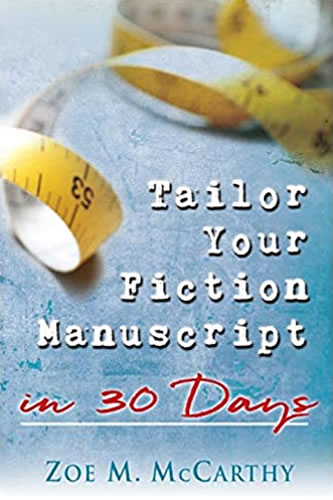

Zoe McCarthy’s book, Tailor Your Fiction Manuscript in 30 Days, is a fresh and innovative refocusing of your novel or novella. Through a few simple—and fun—steps, Zoe helps writers take their not-ready-for-publication and/or rejected manuscripts to a spit-polish finish. Writing is hard work, yes, but it doesn’t have to be difficult.—Eva Marie Everson, best-selling and award-winning author, conference director, president of Word Weavers International, Inc.
So who is your personal story about? It’s about the reader and his/her reading experience.
If you’re writing a story based on your personal experience, be careful to avoid the following four pitfalls.
Giving Unnecessary Backstory
A personal story is meant to be based on a small slice of a writer’s considerable lifelong material. So, writers must refrain from slowing the forward motion of their particular story by telling side anecdotes or going off on tangents.
Sometimes writers stick these extras in odd places in the story as if they thought of a side story while writing page eight and place it there when it had a small connection to what they wrote on page two.
Novelist Sir Arthur Quiller-Couch’s advice is good: “Murder your darlings.”
Explaining
The story is about an interesting event that happened in the writer’s life. But instead of building the story tension, the writer explains why he took such and such action. Or instead of giving the flavor of the setting the writer details the setting as if he’s writing a travel book. Or tells the reader the differences between the technology of that time and the current day.

Who’d want to read historical fiction if the writer interrupts the story to tell the reader only rotary phones existed at the time, instead of simply showing the character entering a telephone number one digit at a time on the black telephone’s dial.
Adding Unnecessary Information
Here the writer peppers the real story with their likes and dislikes, their preferences, and their judgments that have little or no bearing on the event. Sometimes the writer reminds the reader of information the writer already revealed, forcing the reader to read repetitious information instead of getting on with the story.
Telling the General Story and Impact Up Front
The writer thinks mentioning the bad or good event in general terms and how it affected their perspective on life before they begin the story is a teaser. No. It needs a spoiler alert. It removes the thrill of reading the actual event when and if they ever get to it. Sometimes the writer does this multiple times in the story before another secondary event.
Example: Revealed early in the writer’s marriage. If I’d known Jerry was going to divorce me in two years, I’d have opened a bank account and put half our money in my account.
What else ruins a person’s personal account of an event?

I finished reading Tailor Your Fiction Manuscript in 30 Days. I have AND will highly recommend it to anyone who dabbles in fiction. It’s one of the best “how to” books I’ve ever read.
—Marsha Hubler, Director Montrose Christian Writers Conference
If you want to increase your chance of hearing yes instead of sorry or not a fit for our list at this time, this book is for you. If you want to develop stronger story plots with characters that are hard to put down, this book is for you. Through McCarthy’s checklists and helpful exercises and corresponding examples, you will learn how to raise the tension, hone your voice, and polish your manuscript. I need this book for my clients and the many conferees I meet at writer’s conferences around the country. Thank you, Zoe. A huge, #thumbsup, for Tailor Your Fiction Manuscript in 30 Days.
—Diana L. Flegal, literary agent, and freelance editor



 RSS - Posts
RSS - Posts



Delightful and insightful!
Thanks for stopping by, Jenny.